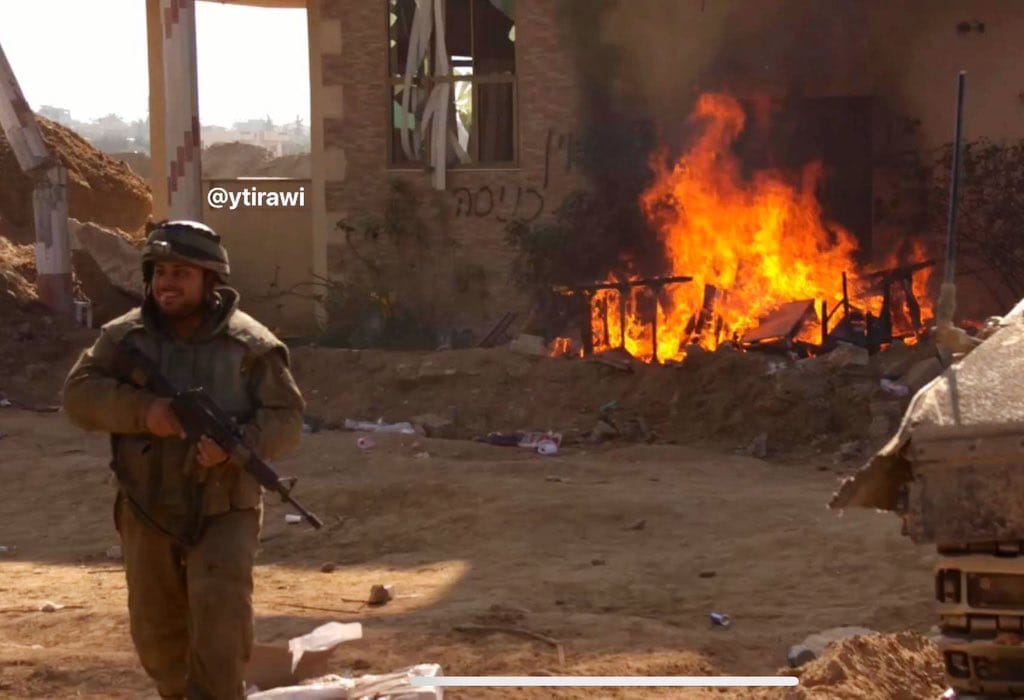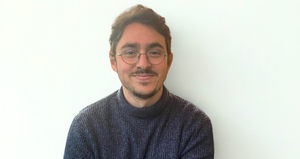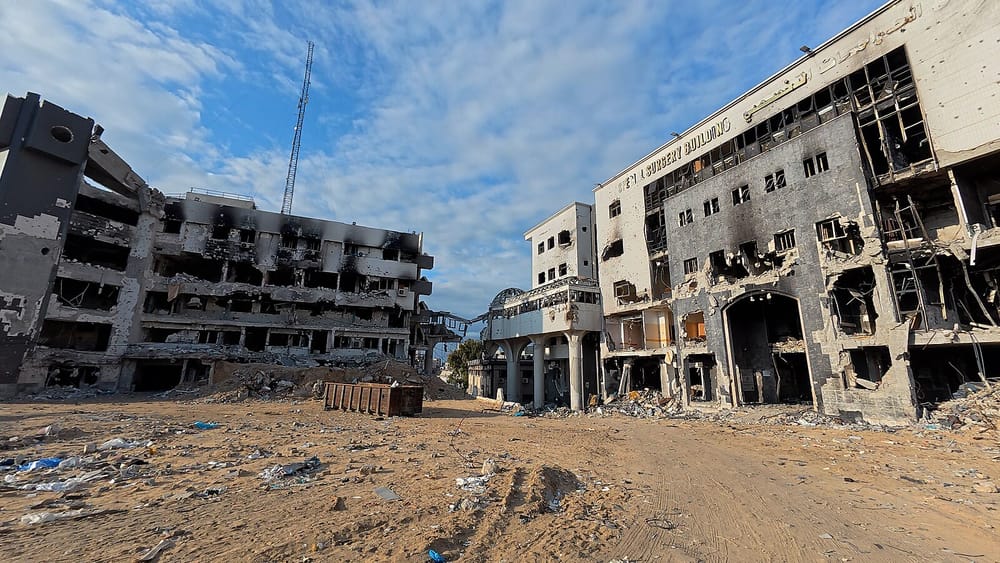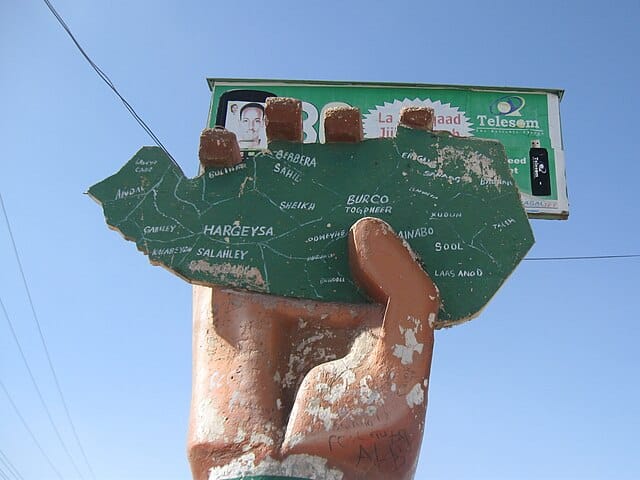“It’s a task for a whole generation”: how the Hind Rajab Foundation pursues Israeli war criminals around the world
A conversation with HRF chairman Dyab Abou Jahjah

Early this morning, Israel ratified phase one of a ceasefire agreement with Hamas. According to the agreement, the ceasefire will go into effect within 24 hours, with an initial limited withdrawal of Israeli forces and a prisoner exchange to follow.
What Israel has agreed to do in principle is likely to be very different from what it will do in reality. In the hours after its ratification, Israel continued to bomb Khan Younis and Gaza City, while preventing the delivery of aid to designated UN warehouses. Its track record of unilaterally collapsing ceasefires is well-documented. Since Donald Trump’s Wednesday announcement that both parties had agreed in principle to the ceasefire, many Palestinians have reported their feelings of “cautious optimism”.
Nothing beyond this first phase of Trump’s flagranty colonial 20-point plan has been determined, including significant details about the timing and lines of Israel’s withdrawal and the composition of a future Gaza governing body. The only certainty, it would seem, is that Israel, the US, and the UK (if it is permitted a voice beyond looming viceroy Tony Blair) will do all they can to deny Palestinian self-determination.
Should the ceasefire actually hold and attention shift to the next phases of the plan, it is incumbent upon us not to let the carnage of the past two years be quietly and conveniently brushed under the carpet: the world must not forget the individual victims of the Gaza genocide – nor its individual perpetrators.
Last week, before news of the ceasefire, I spoke to Dyab Abou Jahjah, co-founder and chairman of the Hind Rajab Foundation (HRF). Named in memory of the Palestinian child shot at over 300 times by Israeli forces, as she and her family tried to flee Gaza City, the foundation works to bring Israeli soldiers who have committed war crimes to justice, taking legal action against them in national courts around the world.
Over Zoom, Abou Jahjah and I discussed HRF’s early successes, the resistance they’ve faced from prosecutors, and the decades of work it will take to achieve accountability for the horrific crimes perpetrated against Palestinians in Gaza.
This interview has been edited for length and clarity.
– Evan Robins
What does the Hind Rajab Foundation (HRF) do?
The foundation was started in 2024, so it's quite new. Its big overarching mission is to end Israeli impunity and to get justice and accountability for the genocide happening in Gaza. To achieve that, we do offensive litigation, as we call it.
We file cases on several levels, not just the international level, but also in national courts based on universal jurisdiction [the legal principle that allows a country to prosecute crimes against international law, even when the crime did not occur on its territory and neither the victim nor perpetrator is a national of that country], as well as, and more importantly for us, dual nationality. We try to cover the whole range of implicated people, from foot soldiers to commanders to those politically responsible. Our approach is quite expansive.
What kind of precedent is there for this legal approach?
Universal jurisdiction is controversial, but it shouldn't be because it's a very established principle of international law. It’s in the Geneva Convention, and states don't have to be a signatory to have to abide by universal jurisdiction when it comes to war crimes.
In reality, the principle is totally contested and countries try to pull out of it, give it a minimal interpretation, and generally restrict it as much as they can. The dual national track is less controversial because nobody denies that a country has jurisdiction over its own citizens. Nonetheless, we thought it was important to open the battle for universal jurisdiction again.
We started filing cases on what we call traveling soldiers. These are people who only have Israeli nationality and travel around for vacation or other reasons after they commit war crimes. Initially, many of these filings were dismissed, and this remains the most common result. However, in a few cases, countries have actually acknowledged universal jurisdiction and opened investigations into these soldiers. It happened in Brazil, Peru, and recently Belgium.
As the common dynamic among prosecutors across jurisdictions is that they would rather not pursue these soldiers, we understood very early on that we needed to file only when we have very strong cases. We then expect law enforcement to be in a tough spot if they don’t do anything about it.
Of course, it is frustrating when there's a criminal probe in Brazil, but Israel helps the soldier sneak out of the country. Or there's an investigation in Peru, but the soldier just leaves the country. Or even in Belgium, where the soldiers were arrested for a few hours and then released. But at the end of the day, it's not just about the outcome in these cases, it's also about reestablishing and reeducating prosecutors about their responsibility under international law.
Right now we’re filing an appeal against a universal jurisdiction case that Spain rejected on the basis that the suspect needs to be a resident. We’ve noticed that Spanish public opinion and the media are indignant at the fact that the state is not acknowledging the principle of universal jurisdiction. This is a shift, and that is also important for us.
Spain is an interesting example, considering that in the late 90s and 2000s it did actually pursue a universal jurisdiction case against the leaders of the Guatemalen genocide. My understanding is that Spain and other countries have since adopted much more restrictive legal guidelines on when cases can be prosecuted on this basis.
That’s right. In Belgium, too, the law changed dramatically around 2003 from a very broad universal jurisdiction law into a law necessitating a nexus with Belgium [that is, a requirement for some form of link between the perpetrator and the state in which the legal proceedings are to take place]. We argue, however, that the nexus could be the person’s presence on the territory. Prior to the actions of the Belgium prosecutor office, the media interviewed every possible expert in international law in Belgium. Almost unanimously they all said Belgium had no jurisdiction based on Belgian law. We are essentially arguing, in a maximalist sense, that your law is crap if it doesn't fit within the Geneva Convention.
It's quite an ambitious argument. If we were to base ourselves on precedent, our position would be very shaky. That’s also because we’re not primarily going after leaders – but soldiers, sergeants, and lieutenants. It's counterintuitive, because it should make it easier since they don't have any form of immunity, but it actually makes it more sensitive. The work we really rely on in terms of achieving accountability is that of dual nationals, because we don't have the whole headache of establishing jurisdiction or them being present in the territory.
However, the traveling soldier strategy remains very important because these people are going to be moving around the world for decades to come. So we’re establishing the methodology with which to pursue these cases. We’re opening the minds of the prosecutors. It's slow, but it’s happening.
The Tomorrowland case, in which two Israeli soldiers were arrested by Belgian authorities at a music festival last July, seemed to mark a breakthrough in Europe’s application of universal jurisdiction against Israeli soldiers for the genocide in Gaza. Can you take me through HRF’s work on this, from identifying the soldiers, to communication with the prosecutor, to the arrests.
We already had one of the two soldiers in our database when the Global Legal Action Network (GLAN) contacted us and informed us they knew of another soldier at Tomorrowland. We exchanged information and built a file.
These guys were from two different units – one of them was Givati, the other was in the Combat Engineering Corps. They are war criminals, but even within the scope of war criminals, they are really notorious. One of them – the Givati guy – he was involved in torture, in taking civilians as hostages and humiliating them, attacking hospitals. A very, very troubling profile.
How did you determine this? From open source research?
From his own social media. We analyse vast amounts of social media data. We extract and preserve posts and their metadata. We then classify and organise everything so that we don’t just have evidence for one person, but to build knowledge of the units, the battalions, and the brigades.
Through this work, we’ve essentially composed a full picture of what has happened in Gaza – both in time and space, but also in terms of the hierarchy of the Israeli army. This helps us build a case when we file against perpetrators. It meant we could state his battalion, his company, his squad, and even what other people from his squad have done. That way, the incriminating arc is broader than just his own posts. But we also do have images and footage of him humiliating patients, medical personnel, and doctors in hospitals and other comparable crimes.
The other soldier is a combat engineer and a company commander. His company was involved in massive destruction of civilian infrastructure, which is also a war crime. Since he had a command position, he's directly responsible for what his soldiers were doing.
Together these two files were very strong, but of course all the pressure of the world was on the Belgian authorities to do nothing. The HRF is based in Belgium and we know the political and legal scene here. We had some back channels and we knew that there was a lot of friction within the authorities and the prosecution office, as well as some political pressure against the arrests.
So we decided to go public with it. In the traveling soldier cases, we almost always go public because it's pretty much the same everywhere: the countries won’t do anything until you start a debate about it. So we turn on external pressure.
In the dual national cases, we will almost never communicate publicly. I don't think you've heard a lot of dual national cases that HRF has done, right? You won’t find them on our website because we don’t want to put pressure on an open investigation.
Are you saying that there are a number of dual national cases that are open and ongoing that haven’t been reported?
Yes, correct. But what Belgium did was spectacular because they didn’t just acknowledge jurisdiction and open an investigation – that had already happened in Brazil and in Peru. They went further. They actually went in and took action. They arrested them, and the way they arrested them was significant. They didn't wait until the two guys were leaving the country. They went and got them from Tomorrowland, handcuffed them, and took them by force to interrogation. Belgium sent a message; they did not have to do it like that. I think it was an important moment for us that we can build on.
As you mentioned earlier, the soldiers were then released. About a week later, the prosecutors referred the case to the ICC. What are your expectations as it proceeds from this point?
The ICC is like a black box. You have no rights in terms of asking, as a civil party, what's going on. It’s very difficult to say what the ICC will do with it.
It's also very difficult to understand what’s going on at the ICC more generally after all the pressure that’s been put on it. It’s all very illustrative of how international law is a battlefront for humanity right now. This is the first time that international law is trying to go against friends of the hegemonic powers; usually it only goes against their enemies.
It'll be very interesting to see where the whole story of international law goes. I believe it's either going to become something real – an international law with teeth – or it'll be unmasked as a total scam, and that's that.
I think national laws are more robust because they are embedded within the power structures of countries. You can go against power more freely.
Is that the case in the UK? Have there been universal jurisdiction or dual national prosecutions here?
The UK is a very interesting venue in terms of legal action. It might surprise you as someone living there, but it’s actually much more serious than most European legal structures. It allows room for maneuvering, unlike in Germany, for example, where it’s totally absurd to file. When it comes to this issue, it's almost as if Germany doesn’t have rule of law. It's totally politicised.
With that being said, we’ve already filed one universal jurisdiction case in the UK and the response was rather negative. It was about an Israeli contractor who took part in the demolition of civilian infrastructure in Gaza, who was then in the UK. Notably, they didn’t dismiss it based on jurisdiction. But they said the filing didn’t have enough elements to pursue him, which is nonsense. You could connect him to demolitions in Rafah, and the ICJ has already decreed that any Israeli activity in Rafah is unlawful. So it’s not a real argument.
We also filed a couple of cases against politicians, including Israel’s Minister of Foreign Affairs and the President of Israel. Both cases have been dismissed on the basis of immunity, which we knew would happen. Just like with universal jurisdiction, we're trying to stretch the status quo and legal terms to contest immunity for heads of state who are involved in war crimes. This is a battle we will keep waging.
We are currently working on a major case against a British-Israeli dual national. We should be filing in less than a month. I’m personally hopeful for this case. I think something very important might come out of it.
How many dual national soldiers are there? What’s the scale of this phenomenon?
The Israeli army is a multinational army. In some countries, you have a massive number of dual nationals fighting. The United States has tens of thousands, but also Turkey, for example, has almost 4,000 dual nationals fighting there.
A lot of these people are rather fanatical. Many are what they call lone soldiers who just volunteer themselves. These people are driven and they have a higher propensity for committing war crimes. A famous example is the sniper unit called the paratroopers from the famous ghost unit of Refaim. Many of them are dual nationals, from France, Germany, Canada, the United States, and Belgium. These are the people who have the most kills and boast about it.
On what kind of timeline is HRF working? Is there an end?
If we wanted to pursue the pipeline that we have now, we would need about a decade to do it – and we work fast and file a lot of cases. Every day our researchers and data miners are adding new files.
We know that what we’re seeing is just the tip of the iceberg because it’s what has been posted and communicated. I think people will only really understand what’s happened in Gaza after the genocide stops; it is far beyond what we know, both in terms of the casualties and the atrocities committed.
As HRF, we're playing our role and gathering the data, but we don't see an end to this. It’s not a task for just one organisation – this is a task for a whole generation.▼
Author

Evan Robins is an editor at Vashti.
Sign up for The Pickle and New, From Vashti.
Stay up to date with Vashti.



